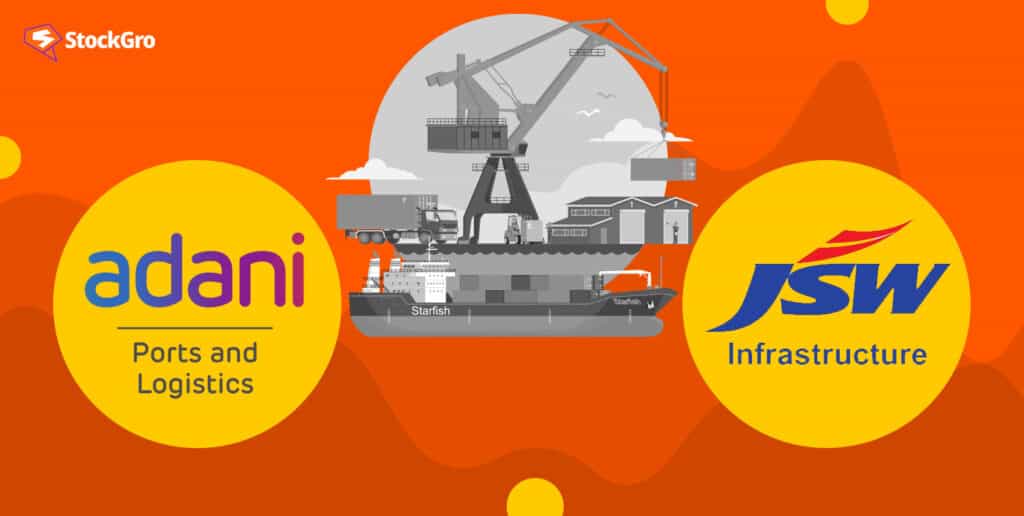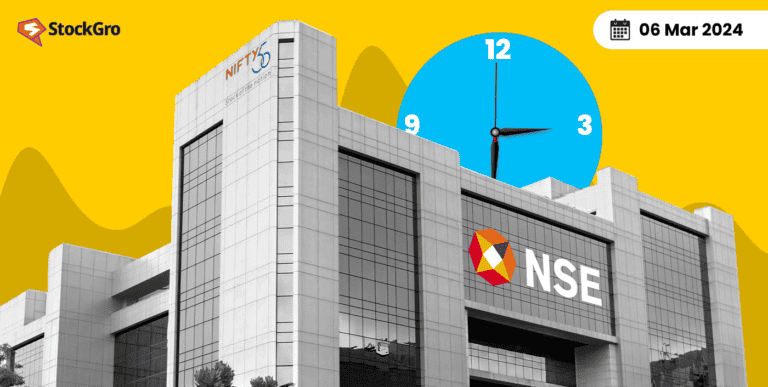
An incredible increase of more than 10% year-on-year (YoY) was achieved in FY23 as the largest ports in India managed the highest-ever cargo of 795 million tonnes. Adani Ports and Special Economic Zone (APSEZ) and JSW Infrastructure, two prominent participants in this sector, are set to reap the rewards.
Both companies are capitalising on the increasing demand for international trade and investing to manage larger amounts of cargo more efficiently. With Adani Ports’ share price at Rs 1325.90 and JSW Infra at Rs 252 as of March 6, 2024, which one poses a better investment opportunity?
This article compares the leading companies in the sector, focusing on their financial ratios. Let’s get started.
Also read: JSW Infrastructure Ltd. IPO: Is it smooth sailing ahead or a stormy sea?
Evolution of Adani Ports
Gujarat Adani Port Ltd. (GAPL) was formed as Adani Ports and Special Economic Zone Limited (APSEZ) on May 26, 1998, to develop a private port on the West Coast of India. At the time, it was the biggest private port and Special Economic Zone in India.
The company has grown from its inception in 1998 to become India’s leading private port developer and operator. It handled nearly 15% of India’s cargo in FY20 through its operations at Mundra Port in Gujarat, the country’s busiest commercial port.
The firm’s holdings extend beyond ports to include integrated logistics and special economic zones (SEZs). Ten domestic ports in six different Indian states are under the company’s control at the moment. In the third quarter of fiscal year 2023, revenue for APSEZ was $584.90 million.
Financials
| Metric | Value |
| Market capitalisation (₹ Cr.) | 286,175 |
| Book value per share (₹) | 210.25 |
| Dividend Yield | 0.38 |
| ROCE | 9.53% |
| ROE | 11.69% |
| Face value (₹) | 2 |
Investing in Adani Ports
Adani Ports, the biggest port operator in India, might exceed volume projections for FY24. The company’s reported quarterly volumes for the period of October to December 2023 were 42% higher than the previous year.
With a volume growth rate predicted to be 1.5 times the GDP growth rate, APSEZ is determined to achieve its FY25 port traffic objective of 500 MMT, up from 339 MMT in FY23. In addition, in terms of yearly cargo volume in FY23, two of the ports operated by APSEZ were among the top ten ports in the country.
From an investment perspective and considering Adani Ports’ share price history, Adani Ports shows a strong signal for investors in the sector.
Also read: Green tycoons unite: Adani & TotalEnergies’ $300M eco-venture!
Shareholding pattern of Adani Ports
The shareholding pattern (as of December 2023) of Adani Ports is as follows:
Promoters: 65.89%
Foreign Institutional Investors (FIIs): 14.72%
Domestic Institutional Investors (DIIs): 12.01%
Public: 7.39%
History of JSW Infra
The private Indian infrastructure firm JSW Infrastructure is among the country’s most prominent names. More than 1200 people make up the company’s workforce, which has been operational since 1999. At present, the business deals with a wide range of cargo categories, such as containers, gases, liquid and dry bulk, among others.
With a total operating capacity of 170 million tonnes annually as of February 2024, the corporation has one terminal in the United Arab Emirates and ten ports and terminals in India.
Financials
| Metric | Value |
| Market capitalisation (₹ Cr.) | 52,626 |
| Book value per share (₹) | 7.92 |
| Dividend Yield | — |
| ROCE | 16.7 % |
| ROE | 4.18% |
| Face value (₹) | 2 |
Investing in JSW Infra
With its initial public offering price of ₹119 and following a surge of over 100% in less than six months, the recently listed JSW Infra’s share price as on March 7 is Rs 250. In early October 2023, the port infrastructure business went public on NSE and BSE for ₹143, a premium of 20.17% above its IPO price.
This marked a solid start on the stock market. JSW Infra’s share price increased by 3.2% in January and has since risen by 10% in February alone. In the third quarter of FY24, the company had ₹940.11 crore in revenue from operations, an increase of 17.85% YoY.
With the right risk management strategies in place, it seems like a great investment option for anyone aiming for the JSW Infra share price target of ₹304 at this point.
Shareholding pattern of JSW Infra
The shareholding pattern (as of December 2023) of JSW Infra is as follows:
Promoters: 85.61%
Foreign Institutional Investors (FIIs): 2.43%
Domestic Institutional Investors (DIIs): 4.08%
Public: 5.2%
Also read: Maritime industry: How India’s shipping and port industry is making waves
Adani Ports vs. JSW Infra shares: which one to choose?
Nearly a quarter of India’s cargo traffic is handled by Adani Ports, making it the biggest commercial port operator in India. Conversely, with concession periods of 30-50 years, JSW Infrastructure can see its revenue streams clearly for years to come thanks to its nine ports and port terminals.
Furthermore, in terms of freight handling capacity, APSEZ is at the forefront. In contrast to JSW Infrastructure’s 170 MTPA installed capacity, the organization’s cargo handling capability will reach 400 MTPA in FY24.
Looking at how the two companies have done on the stock markets, Adani Ports is once again at the forefront. Compared to Nifty 50’s 27.5% return in the previous year, the company’s return was 137.5%.
The stock of JSW Infrastructure has increased in value by more than 49% since its listing on the stock market in October 2023, while that of APSEZ has increased in value by 60.7% over the same time.
As of March 6, 2024, Adani Ports has a significantly higher market capitalisation and current market price (CMP), indicating a larger market presence. JSW Infra, while smaller in market cap, shows a remarkable quarter profit variation percentage, suggesting rapid recent growth.
Compared to JSW Infra, Adani Ports appears to be in better financial shape, with a lower P/E ratio. This might mean that the stock is more reasonably valued based on its profit potential. On the other hand, JSW Infra does not offer a dividend yield, unlike Adani Ports, which could be a consideration for income-seeking investors.
Adani Ports leads in net profit and sales for the quarter, reflecting its larger-scale operations. However, JSW Infra has a higher ROCE %, reflecting potentially better efficiency in generating profits from its capital.
This comparison highlights Adani Ports as a larger and possibly more stable investment, while JSW Infra shows potential for growth and efficient capital use.
Conclusion
From an investment standpoint, the competition between Adani Ports and JSW Infrastructure presents an attractive opportunity. With its dominant market position, Adani Ports offers the potential for sustained growth and value creation.
However, JSW Infrastructure’s aggressive moves in the stock market make it an intriguing investment option for those seeking exposure to the rapidly evolving port sector.

